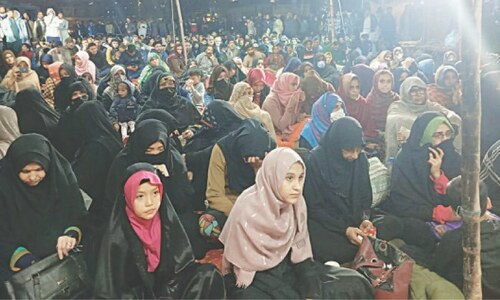KARACHI: Twenty-seven doctors from the city’s six major hospitals were awarded certificates in emergency medicine at a ceremony held at the Indus Hospital on Saturday.
It’s the first batch of the one-year certification programme in emergency medicine initiated by the Indus Health Network (IHN) being supported by the Habib Bank Foundation and the Harvard Medical School’s Centre for Global Health Delivery, Dubai.
The specialised training was conducted by 12 emergency medicine specialists recruited in Canada, the United States, the United Kingdom, Australia, Saudi Arabia and Malawi, each spent one month in Karachi teaching a curriculum that was developed in line with the national and international emergency medicine priorities and recommendations.
At the ceremony, attended by health experts and the leadership of partnering institutions across Karachi, speakers highlighted that emergency medicine was still a developing medical specialty in the country with high mortality and morbidity rates from emergency conditions, such as acute cardiovascular disease, trauma, and stroke.
Pakistan, it was pointed out, barely has a handful of trained emergency medicine specialists, and only nine institutes were officially recognised to provide residency training in emergency medicine. This shortage of trained specialists would take more than a generation to fulfil.
“It’s the end of graduates’ training but the start of an acute care and emergency medicine momentum that is much needed across Pakistan,” said Dr Lubna Samad, a programme director at the IHN and also part of the hospital’s certification programme.
Highlighting the salient features of the programme, she said that it’s innovative offering both didactic and practical learning, supervised by the local and international faculty.
Educational innovations included point-of-care ultrasound practice, flipped classroom sessions, practical workshops, weekly case-based discussions over a messaging application and use of low-cost improvised models to hone procedural skills, she said.
Dr Asad Mian, representing the Aga Khan University Hospital, underscored the need for innovation in emergency medicine in resource-constrained settings and how transformative it was.
Dr Munawar Khursheed of the National Institute of Cardiovascular Diseases talked about the impact training had on the quality of care provided in emergency medicine.
According to the spokesperson of the Indus Hospital, the next cycle of training in emergency medicine has started and it is expected that these young graduates would have a positive impact on emergency care provision in Karachi.
This effort would be expanded in the coming years to improve emergency care across the country, he said.
Published in Dawn, July 8th, 2019













































Dear visitor, the comments section is undergoing an overhaul and will return soon.